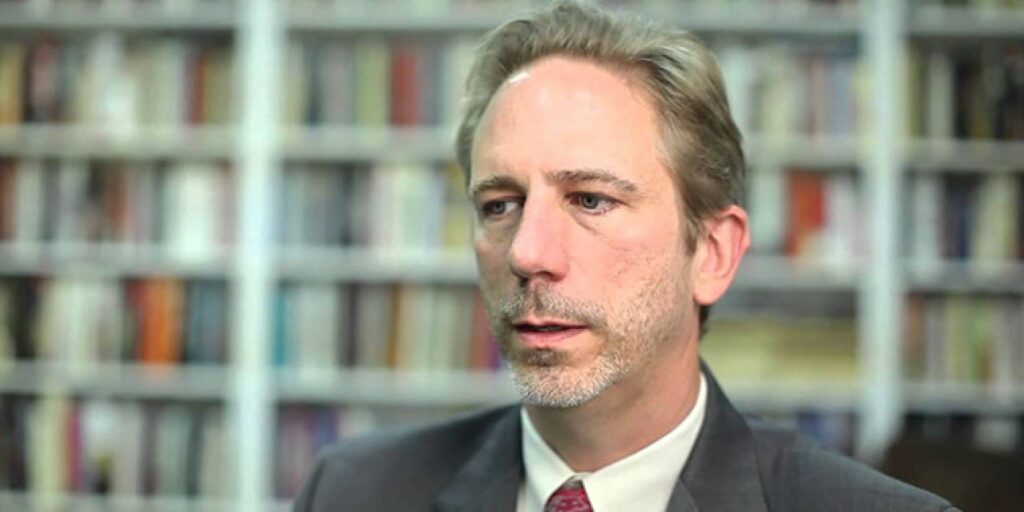Pete Buttigieg is a sodomite who is running for president in the Democratic primary. Late last week, after Buttigieg called himself a ‘gay Christian,’ Franklin Graham made waves for telling him that homosexuality was something to repent for, not to be proud of. Since then, Graham has received constant criticism for his remarks from leftist Christians. Yesterday, Pulpit & Pen covered a Jesuit priest who accused Graham of being too literal. Today, it’s Baptist theologian, David Gushee, who says that the evangelist is being too literal.

David Gushee, who is a professor of Christian ethics (LOL) at Mercer University opined on the tweets from Graham, calling homosexuality sinful. Gushee, who changed his mind on the sinfulness of sodomy in 2014 and wrote a book defending the gross practice entitled Changing Our Mind, then began to defend the notion of a “gay Christian.”
Gushee recently appeared on CNN with Don Lemon (a sodomite who plans to get “married”) to explain the “Baptist view” on why Franklin Graham’s comments are wrong.
“Well, I think what we’re talking about here is a long history of selective biblical literalism that takes certain passages or sentences, strands of the Bible, severs them from the heart and example of Jesus and ends up using that selective literalism to hurt people,” Gushee said. “It’s a long history of that from anti-Semitism to grotesque sexism, support for slavery, colonialism, segregation, even the exclusion of divorced people from the church, and right now, the main battleground is LGBTQ inclusion.”
Rather than deal with the Bible’s clear and repeated condemnations of homosexuality, Gushee simply brushes them aside by claiming that Christians are holding to ‘selective’ biblical literalism. We assume by ‘selective,’ the alternative is to believe none of the Bible, which seems closer to Gushee’s approach.
Regarding literalism, that word has meaning. See below.

To be literal means to take words in the usual or most basic sense without metaphor or allegory. So then, the antonyms for literalism would be metaphor or allegory.
Certain passages in the Scripture, especially prophecy and apocalyptic literature, should be taken metaphorically or allegorically. Whether or not this interpretive and hemeneutical tool should be employed typically depends upon the genre of literature.
If something isn’t taken literally, it must be taken metaphorically or allegorically. Tell me, please, what is the metaphoric or allegorical interpretation of these passages?
You shall not lie with a male as with a woman; it is an abomination (Leviticus 18:2).
If a man lies with a male as with a woman, both of them have committed an abomination; they shall surely be put to death; their blood is upon them (Leviticus 20:13).
Or do you not know that the unrighteous will not inherit the kingdom of God? Do not be deceived: neither the sexually immoral, nor idolaters, nor adulterers, nor men who practice homosexuality, nor thieves, nor the greedy, nor drunkards, nor revilers, nor swindlers will inherit the kingdom of God (1 Corinthians 6:9-10).
These are all allegory for what, exactly? What is Gushee’s alternative interpretation of these passages?
Of course, Gushee doens’t have an alternative metaphoric interpretation. He just chooses to broadbrushingly dismiss them rather than selectively believe them.
The selective accusation from Gushee is no doubt tied to the old LGBTQ canard that because Christians view the Ceremonial Laws of the Old Testament (like circumicision or kosher diet) to be abrograted that the Moral Laws (like the type that forbid sodomy) must be discarded as well. In reality, Christians have had this interepretation of Ceremonial Law abrogation and Moral Law continuance since at least Acts 15 and the Jerusalem Council and it’s certainly nothing new to the LGBT debate.
Gushee said…
“There are a lot of different ways the Bible can be interpreted, and in the past it has been interpreted to harm people,” Gushee said. “And in many cases, the conservative Christians changed their minds on those issues. But, right now, they’re digging in their heels on LGBT inclusion.”
Again, alternative interpretations of “don’t be a homosexual” (that’s a paraphrase) from Gushee seem to be lacking. Ignoring a passage is not interpreting it.
Gushee taught for three years at Southern Baptist Theological Seminary, where he earned his Masters-in-Divinity degree, before going to Union University and eventually Mercer University.











